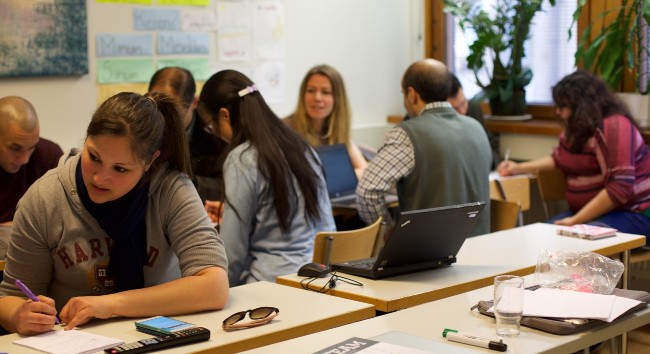Improving language learning and integration outcomes for adult migrant and refugee learners of English

Many migrants and refugees in the UK face disadvantage and discrimination, and there is growing anti-migrant sentiment in some sections of the population. Policy and public discussions surrounding migrant integration tend to focus on the individual responsibilities of migrants and refugees to improve their English skills, and to adapt their social and cultural practices. Yet migrant and refugee non-expert speakers of English can encounter multiple barriers to learning the English language and achieving their potential in Britain.
About the research
This research project investigated adult ESOL (English for Speakers of Other Languages) learners’ perspectives on their experiences and priorities regarding both language learning and integration. In-depth accounts of 14 ESOL learners’ language learning and integration trajectories were captured through repeat interviews (32 interviews in total). A questionnaire was conducted with 409 learners across England and Wales.
The samples broadly represent the rich diversity of multilingual migrants and refugees in Britain.
We refined the recommendations resulting from this research after seeking the expert advice of migrant and refugee stakeholder groups at an in-person workshop.
Policy recommendations
ESOL funding and provision:
- ESOL providers, employers and HE institutions should collaborate to support career and educational progression.
- Curricula should accommodate the diverse identities, aspirations and skills of learners to enhance learning and maintain motivation. Funding should be provided for local-level centralised ESOL resource banks.
- Teacher training should include trauma informed practice and raise awareness of how marginalisation impacts learning. Teachers should be trained in, and supported to use, participatory and multilingual teaching approaches.
- Funding should be remodelled to ensure provision is accessible to all and supports all learners’ needs.
Integration policies and strategies should:
- Recognise integration as the ‘work’ of all members of society, and facilitate inter-community connections across all sections of society.
- Challenge negative stereotypes and tackle discrimination towards migrants and refugees. Anti-migration political rhetoric is counterproductive to integration.
- Recognise migrants and refugees’ contributions to society, build on their existing skills, and involve those with experience of migration in solutions.
- Increase training and employment programmes which support migrants and refugees to achieve their potential.
- Fund and support services which promote feelings of well-being and safety for migrants and refugees.
- Allow people seeking asylum equal access to ESOL and employment.
Key findings
- The research identified a ‘Catch-22’: English proficiency can improve integration outcomes for multilingual migrants and refugees, but positive integration experiences are also needed to facilitate progress in English learning.
- Language learning is a process which takes place in a social context and is not limited to the classroom.
- The diverse experience, skills and multilingual expertise which migrants and refugees bring with them are often not recognised or valued.
- There are many barriers to accessing and progressing in ESOL classes. Learning English can take years and maintaining motivation can be difficult. Supporting learners to hope that they can achieve a better future helps them to stay invested in their language learning.
- There is growing evidence that participatory and multilingual teaching approaches can facilitate inclusive learning and address the multiple needs of ESOL learners.
- There are many factors besides English proficiency which shape ESOL learners’ integration outcomes.
- Hostile attitudes towards migrants, refugees and ‘non-native’ English speakers can negatively impact ESOL learners’ integration and language learning outcomes. ESOL learners’ confidence to speak in English can be influenced by the responses of people they interact with.
- Feelings of safety, wellbeing, and hope of achieving positive futures are of particular importance for better English language and integration outcomes.
- ESOL learners with insecure immigration status, especially those seeking asylum, face particular barriers to learning English and leading secure and fulfilling lives in Britain.
30% of ESOL learner participants reported experiencing harassment in the previous 12 months. Participants with lower English proficiency were more likely to experience harassment and less likely to report positive interactions with British born people.
‘People don’t like hearing you speaking different languages’. Participant.
‘People always like to belong somewhere, to feel that they are someone’. Participant.
‘When I attend ESOL I can meet new people, I don’t feel lonely or nothing to do’. Asylum seeking participant.
Further information
Court, J. (2021) ‘”Here is a long way”. Language learning, integration, and identity: A mixed methods exploration of ESOL learners’ trajectories’. Unpublished PhD thesis. University of Bristol.
Court, J. and Ramuz, C. (2023) Improving outcomes for multilingual migrants and refugees: Responding to the voices of adult ESOL learners. Project Report. This report details findings from the stakeholder workshop which identified strategies and requirements for actioning the recommendations in this policy briefing
The PhD research was funded by the Economic and Social Research Council, with additional funding from Funds for Women Graduates (BWFG Charitable Foundation).
Author
Dr Jill Court, University of Bristol
Policy Briefing 138: August 2023
PolicyBriefing138CourtLanguageLearningOutcomes ONLINE post launch (PDF, 876kB)
Project Report: Improving outcomes for multilingual migrants and refugees (PDF, 9,807kB)
Contact the researcher
Dr. Jill Court, Senior Associate Teacher and Honorary Research Associate, University of Bristol.
jill.court@bristol.ac.uk